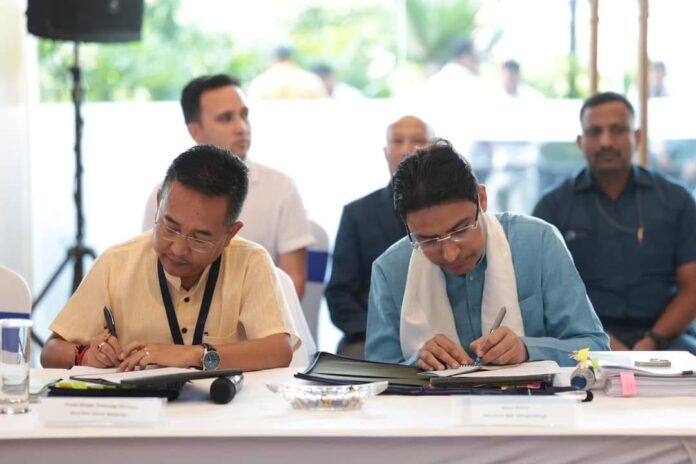Effort to address the long-standing demands of marginalized Nepali communities in Sikkim and West Bengal, Chief Minister Prem Singh Tamang-Golay participated in a key coordination meeting in Siliguri today. The meeting, which brought together prominent political leaders and community representatives from both states, focused on pushing for the recognition of tribal status for these historically left-out communities.
The demand for tribal status has been a pressing issue for these Nepali communities, which have long faced socio-economic disadvantages due to their exclusion from the list of recognized tribes. The meeting highlighted the historical, cultural, and social significance of these groups and the urgent need for their inclusion under the tribal status umbrella, which would afford them greater access to government welfare schemes and protections.
Key stakeholders in attendance included Sikkim’s Lok Sabha MP Indra Hang Subba, Rajya Sabha MP D.T. Lepcha, and several Sikkimese MLAs and ministers, alongside West Bengal’s Darjeeling MP Raju Bista, Kalchini MLA Bishal Lama, and Darjeeling MLA Niraj Zimba. Representatives from various Nepali communities and advocacy groups also presented their case, detailing the economic and social hardships that have stemmed from their exclusion.
The discussions centered on formulating a comprehensive, coordinated strategy to secure tribal recognition. Senior government officials and political leaders weighed in on the need for swift and just action, with expert legal opinions outlining the policy amendments and legal steps required for this inclusion. Participants emphasized the importance of gathering updated population data, historical documentation, and cultural evidence to build a strong case for the communities.
A key takeaway from the meeting was the consensus on the formation of a Joint Action Committee between Sikkim and West Bengal to consolidate efforts and present a unified front in the demand for tribal status. The Joint Action Committee will be tasked with preparing a detailed infographic report outlining the cultural and historical significance of the communities, along with the socio-economic challenges they face due to their exclusion. This report will be used to strengthen their case when presenting the demand to the Central Government.
Chief Minister Golay highlighted the positive reception of the issue by the Central Government, led by Prime Minister Narendra Modi, and reiterated his government’s commitment to pushing the demand at the national level. “Our Members of Parliament, Shri D.T. Lepcha, Dr Indra Hang Subba, and Shri Raju Bista from Darjeeling, bear the crucial responsibility of raising these issues in Parliament. As a political representative, I will also ensure that this matter is brought to the attention of the Central Government,” Golay said.
He further emphasized the need for unity and collaboration between Sikkim and West Bengal to achieve this goal. “This is a matter of social justice for our marginalized communities, and it is imperative that we present a consolidated demand to the Centre. The recognition of these communities is long overdue, and together, we can ensure that they receive the rights and opportunities they deserve.”
The meeting also explored the broader socio-political implications of granting tribal status to these Nepali communities, noting that such recognition would not only serve the cause of justice but also promote inclusivity, cultural preservation, and equitable development in the region. Leaders from both states underlined that tribal status would help alleviate the economic challenges faced by these communities, providing them access to vital government support and opportunities for growth.
The coordination meeting concluded with renewed confidence that the Central Government would address the demand with urgency and empathy. Chief Minister PS Golay extended his gratitude to all the dignitaries and community representatives for their participation and lauded the organizers for the seamless arrangements, underscoring that the day’s discussions marked a historic moment in the movement for the rightful recognition of the marginalized Nepali communities in Sikkim and West Bengal.





